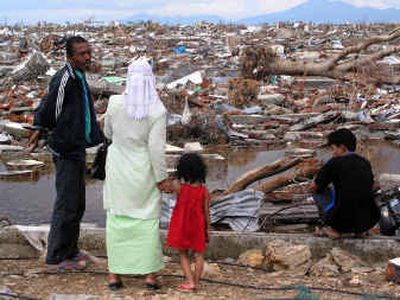Spokane man returns from Aceh

He was shocked to see all the bodies.
More than a week after the tsunami struck Indonesia’s Aceh province, Mark Bardwell of Spokane was taken aback by the corpses that still lay amid the rubble and the smell of death that permeated the air.
“What struck me most was the destruction,” said Bardwell, who returned last week from the area hardest hit by the Dec. 26 earthquake and tsunami. “It looked like a bomb had gone off. People had no chance to escape.”
Bardwell, projects coordinator for Spokane-based Partners International, left for Indonesia on Jan. 4 to help with the organization’s long-term relief efforts in the area.
For the past five years, Partners International – a ministry that has started churches throughout the world – has worked with the minority Christian population of the Aceh province. So when the tsunami struck, Partners International already had partners” on the scene – people indigenous to the area who know the local customs and speak Acehnese – to help immediately.
Three days after the tragedy, an Indonesian relief team supported by Partners International delivered a truckload of supplies – including medicine, five tons of rice and 700 boxes of bottled water – to Banda Aceh. A week later, Bardwell flew in from Spokane to help develop a relief strategy and provide crisis management training for Christian agencies working with survivors.
“Somebody from this office needed to be there to get a real sense of what was happening,” said Steven Downey, vice president of communications and marketing for Partners International, a nonprofit with about 30 employees in Spokane and hundreds of partners in 57 countries.
It took two days for Bardwell to fly into Aceh, located at the northern tip of the Indonesian island of Sumatra. The airport in Medan, located inland, was crowded with people looking for relatives, relief workers, reporters and photographers – all jostling to get on a plane for the tsunami-ravaged coast.
Bardwell’s luggage got lost, so he wore the same pair of pants during the 12 days he spent in Indonesia.
The lack of clothing was a mere inconvenience compared to the devastation he witnessed and the stories he heard, said Bardwell, who grew up in Zambia and Kenya and has traveled all over Africa on behalf of Partners International.
At the camps where people sought help and searched for family members, he met a woman and her young son who survived the giant wave but spent five days floating at sea. Another man told him how he and his wife ran as fast as they could away from the big, black wall of water only to have the wave wash his wife away.
A father in search of his daughter approached Bardwell one day with her photograph. He was desperate, but no one had the heart to tell him that he would likely never find his little girl.
Because of the many deaths, people had no way to identify the corpses strewn among the wreckage of buildings, Bardwell said. Once retrieved, the bodies were buried in mass graves.
Thousands of families in search of loved ones will never know what happened to them, said Bardwell, 39, a father of two. “There’s no closure for them. … When you deal with that much pain and loss, it will have repercussions for years.”
As part of his work there, Bardwell helped train workers from indigenous and foreign Christian relief agencies on grief counseling.
“Our work is not only the physical rebuilding of homes,” Downey said. “We’re also concerned about the emotional and spiritual rebuilding.”
Unlike most relief agencies, which respond to the immediate needs of survivors by providing food, medicine and other basic needs, Partners International is focused on the long-term development of the area. It will be involved in rebuilding schools and houses, as well as shrimp ponds, fish farms and other industries that were destroyed by the tsunami.
The organization had a presence there even before the disaster, Downey said, and it will continue to be there a year from now and long after. So far, donors from all over the country have contributed more than $300,000 to help with Partners International’s efforts in Indonesia, India and Sri Lanka.
“This is a long-term venture,” Partners International’s area director in Indonesia wrote in a recent update. “The role of Christians, in addition to providing essential food, water and medical aid, is to share the comfort and hope that comes from a Savior who knows what it is to suffer terribly. … People in greatest need yearn to talk about God and life and how to make sense of loss and pain.”